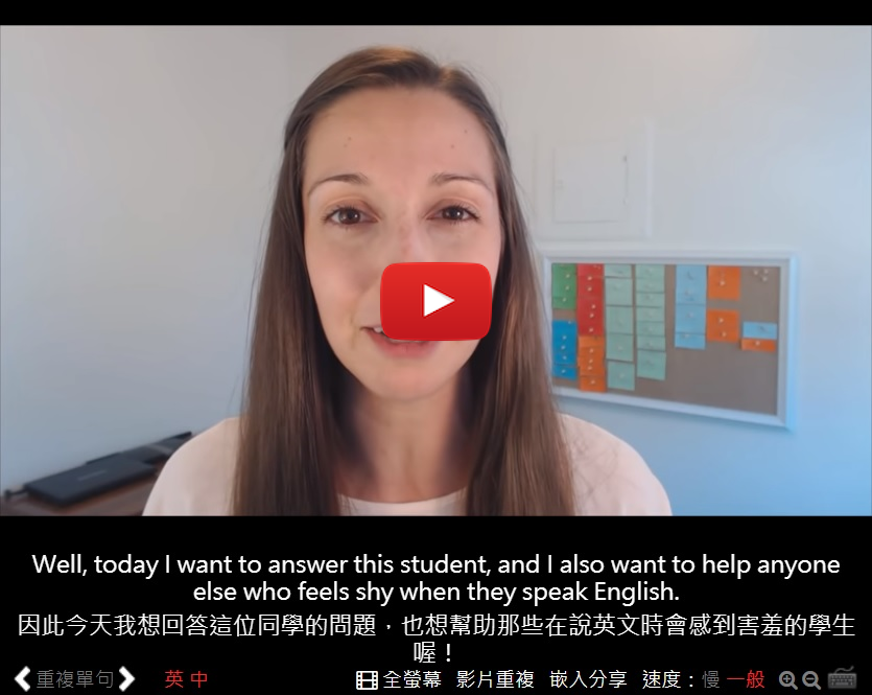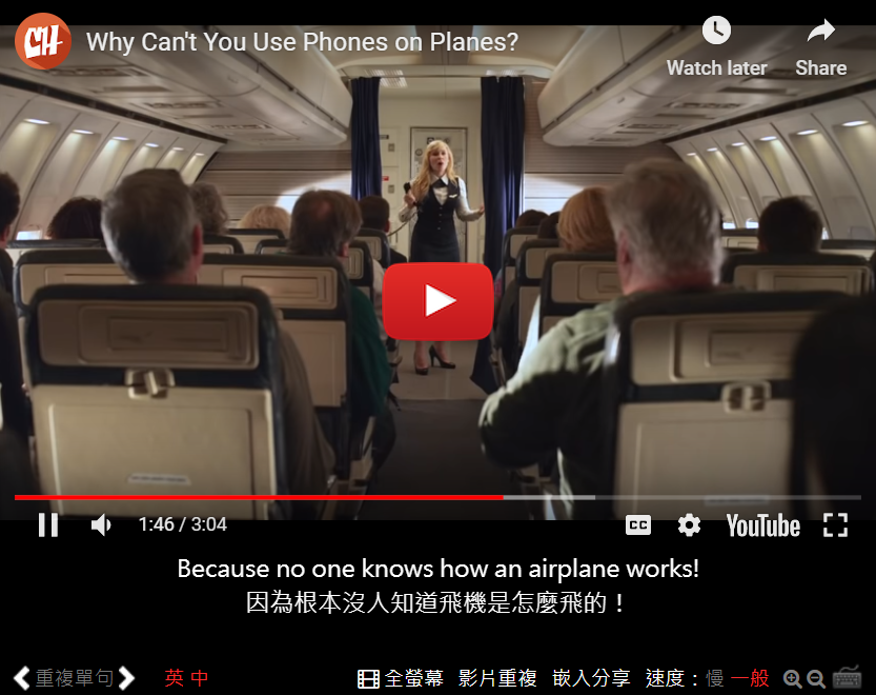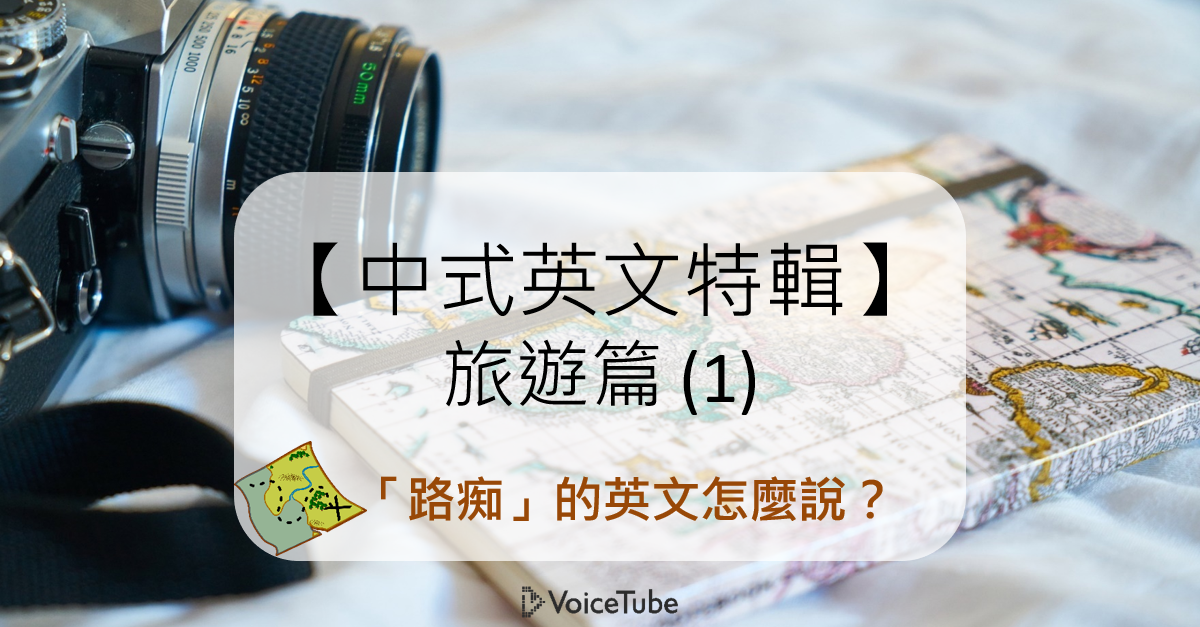出國旅遊,流利英文不可少!
路痴的英文不是 road idiot!
今天,就讓 VoiceTube 來教你如何說出一口道地英文
還不趕快準備好你的筆記本
和「中式英文」說掰掰!
你會說英文嗎?Do you speak English?
(X) Can you speak English?
前往非英語系國家旅遊時,如果想知道對方「會不會說英文」,你一定直覺地想要用助動詞 can 作為問句的開頭。畢竟,從小到大,英文課本都告訴我們 can 有「能不能;會不會」的意思。 Can you speak English? 這句話從文法上來看雖然是正確的,不過這樣的問法容易冒犯到他人。助動詞 can 可以用來表達一個人的「能力」,所以當你用 can 來詢問對方會不會說英文時,會給人一種你在質疑他人英文能力的感覺。禮貌性的問法應該是:Do you speak English? 來看看下面這句 can 的用法:
Our professor is an absolute genius. He can write with both hands simultaneously.
我們的教授一定是個天才,他可以同時用雙手寫字。Tourist: Excuse me, do you speak English?
觀光客:不好意思,請問你說英文嗎?
Local: Yes, how can I help you?
當地人:會,有什麼需要幫忙的嗎?
Tourist: I’m looking for Taipei Main Station. Do you know the quickest way to get there?
觀光客:我在找台北車站,你知道怎麼去最快嗎?
Local: You can take the MRT two stops from here, but it’s quicker to walk.
當地人:你可以從這裡搭兩站捷運,但是走路比較快。
Tourist: I think I’ll just take the MRT–less chance of me getting lost!
觀光客:我想我會搭捷運,比較不會迷路!
Local: Haha, okay!
當地人:哈哈,好!
總是不敢開口嗎?快來看看如何流利且自信地開口說英文! (How to Stop Being Shy in English: Speak Fluently and Confidently)
我是路癡 I have no sense of direction.
(X) I’m a road idiot.
「咦?這條路不是剛剛走過了嗎?」「我是誰,我在哪裡?」如果你也常常出現這些內心 os,代表你跟小 V 一樣是個百分之百的路癡。那麼,究竟「路痴」的英文要怎麼說呢?馬路的英文是 road,而白癡的英文是 idiot,所以…路痴的英文就是 road idiot!錯錯錯,大錯特錯! idiot 這個字強調的是「愚笨、愚蠢的人」,所以如果你用 idiot 來形容自己的話,對方會覺得你過度貶低自己了,因為你只是不擅長認路而已,並不代表你就是個笨蛋啊!正確的說法是 have no sense of direction,這邊的 sense of direction 就是指「方向感」。
Ronald: You’ll need to help me navigate. I have no sense of direction.
Ronald: 你會需要幫我導航,我沒有方向感。
Alasdair: But you’ve lived in this city for ten years!
Alasdair: 但你在這住了十年耶!
Ronald: I know, but I normally take the MRT, so I don’t know the roads very well.
Ronald: 我知道,但我通常是搭捷運,所以我對路不太熟。
Alasdair: It’s hardly rocket science. The streets use a grid system.
Alasdair: 又不難,街道都是棋盤狀的。
Ronald: Can you just help me with the map?
Ronald: 你可以就幫我看地圖嗎?
Alasdair: Okay … take a left down here.
Alasdair: 好…等下這裡左轉。
我可以帶你去 I can take you there.
(X) I can bring you there.
相信許多人的方向感都比小編還要好個幾百萬倍!假如今天遇到有人向你問路,而善良的你決定要親自帶對方到目的地,這時該如何用正確的英文表達呢?大家都知道,bring 和 take 的中文翻譯都是「帶」,但如果要說「我可以帶你去 (某地)!」則應該用 take。這兩個字主要的差別在於「方向」,bring 是將人或物「帶來」,take 則是將人或物「帶走」,請見下方例句:
The waiter took away the empty plate and brought me a glass of wine.
服務生把空盤收走並送來了一杯葡萄酒。Gary: I’d better run; I need to get to the post office before it closes.
Gary: 我最好要走了,我要在郵局關了之前趕去那。
Aidan: Do you know how to get there?
Aidan: 你知道怎麼去嗎?
Gary: I went once a few years ago; I think I can remember.
Gary: 我幾年前去過一次,我想我記得。
Aidan: It’s actually on my way home. I can take you there if you like.
Aidan: 其實就在回我家的路上,如果你想的話我可以帶你去。
Gary: Okay, thanks a lot!
Gary: 好,太感謝了!
我得趕飛機 I have a plane to catch.
(X) I have to rush a plane.
出國旅遊最讓人期待的行程之一就是逛逛機場內的免稅商店!香水、化妝品、名牌包和當地特產應有盡有,加上價格又比較便宜,常常會讓人一個不小心就逛到失心瘋,而忘記班機起飛的時間。這時,如果有個免稅商店的店員仍不斷向你推銷產品,你該怎麼用英文表達你必須「趕飛機」呢?一說到「趕」的英文,很多人都會想到 rush 這個字。不過,要特別注意的是,rush 強調的是「使…趕緊做某事」。「趕飛機」的正確說法應該是 catch a plane。其實,不只是飛機,趕火車、公車,或是任何交通工具都可以使用 catch 來表達喔!
Sorry, I need to leave now. I have a plane to catch.
抱歉,我必須離開了,我得趕飛機。The mother rushes the children off to school every morning.
那位媽媽每天早上都要催促小孩們快點出門上學。Robert: Thanks for agreeing to meet with me.
Robert: 謝謝你答應和我碰面。
Joe: No problem, although I am in a bit of a rush.
Joe: 沒問題,雖然我有點在趕時間。
Robert: How long do you have?
Robert: 你有多少時間?
Joe: I have a plane to catch in a couple of hours.
Joe: 我幾個小時後要趕飛機。
Robert: Okay, I’ll run through the proposal quickly then.
Robert: 好,那我就盡快跟你過一下這個提案。
超好奇!為什麼飛機上不能使用手機?(Why Can’t You Use Phones on Planes?)
今天早上/下午 this morning/afternoon
(X) today morning/afternoon
當你想要和別人分享「今天早上/下午」去了哪裡玩,該怎麼說才能避免說出「中式英文」呢?「今天」的英文是 today,而「早上」和「下午」的英文分別是 morning/afternoon,但「今天早上/下午」並不是 today morning/afternoon。因為 today 是副詞而 morning/afternoon 是名詞,不能這樣組合使用。正確的講法應該是 this morning/afternoon。其他類似的用法像是 this year (今年)、this week (這個星期) 等。
Jessie: I don’t think I’ll go surfing this morning.
Jessie: 我想我今天早上不會去衝浪了。
Bonnie: What’s the matter?
Bonnie: 怎麼了?
Jessie: I had a look at the forecast and it doesn’t look like there’s going to be any waves.
Jessie: 我看了一下氣象預告,看起來好像不會有浪。
Bonnie: Oh … well you can come shopping with me if you like instead.
Bonnie: 喔…如果你想的話你也可以跟我去逛街購物。
Jessie: I think the conditions might get better this afternoon, so I’ll just hang around here and wait and see.
Jessie: 我想今天下午應該會比較好,所以我應該會去附近晃晃然後再看看吧。
________年前 I met Judy two years ago.
(X) I met Judy two years before.
before 和 ago 都可以翻作「…之前」,但兩者在使用時機上卻大不相同。before 把「某一個過去的時間點」當成基準,ago 則是以「現在作為起點」往前推算時間,且應搭配過去式的句子。因此,「________年前」的英文是 ________ years ago,因為是以說話的當下為起點,往前推。
Jimmy drank a glass of hot milk before he went to sleep.
Jimmy 在睡覺前喝了一杯熱牛奶。I booked the flight ticket three months ago.
早在三個月前,我就訂好機票了。Harry: So how long have you and your girlfriend been together?
Harry: 所以你和你女友在一起多久了?
Alice: We met each other two years ago at a pottery class.
Alice: 我們兩年前在陶藝課認識的。
Harry: Oh, how romantic!
Harry: 喔,好浪漫!
Alice: Haha, yes, we clicked straight away and started dating not soon after.
Alice: 哈哈,對,我們馬上一拍即合然後很快就開始約會。
Harry: Well I must say you two make a very cute couple.
Harry: 我只能說你們兩個真的是很可愛的一對情侶。
我去過 ________ I’ve been to ________.
(X) I’ve gone to ________.
小編最喜歡和親朋好友分享各種旅行的經驗!如果想和別人說「我去過 (某地)」,該怎麼說呢?雖然「去」的英文直覺是翻作 go,但是表達「去過 (某地)」時,不能使用 go 這個字喔!在英文裡,可以使用完成式來表達「曾經發生過或做過的事情」以表示經驗。要特別注意的是, have gone to 所表達的意思是「某人已經前往某個地方,而且還沒有回來」。have been to 才是用來形容「某人曾經去過某個地方,而且已經回來了」。
Sally has gone to New York, and she said that she would never come back.
Sally 已經去了紐約,而且她說她不會再回來了。I love travelling. I’ve been to America, Canada, Finland, Spain, Japan, Argentina, and Mexico.
我熱愛旅遊,我去過美國、加拿大、芬蘭、西班牙、日本、阿根廷和墨西哥。John: Have you ever visited Eastern Europe before?
John: 你有去過東歐嗎?
Edith: I’ve been to Prague once and Warsaw twice.
Edith: 我去過一次布拉格,兩次華沙。
John: Worth the trip?
John: 值得去嗎?
Edith: I really like Warsaw, especially the museums and art galleries.
Edith: 我很喜歡華沙,特別是他們的博物館和藝廊。
John: Oh, is there not a lot of culture in Prague then?
John: 喔,那布拉格沒有太多文化囉?
Edith: There is, but the city itself is a lot more touristy.
Edith: 有,但是這城市的觀光氣息比較重。
讓別人喜歡你的 7 個心理學技巧! (7 Psychological Tricks To Get Someone To Like You!)
以上,各種中式英文錯誤你曾經犯下了哪些?
沒關係,犯錯是成長的開始!小編相信現在的你又離「道地英文」更接近了!
迫不及待想馬上開始練習嗎?
快打開 VoiceTube App 練英文!
✦ 立即下載 >>> https://bit.ly/myenglishissogood
英文單字不要硬背! 藉由 VoiceTube App 看影片,不會的單字反覆聆聽,加上單字測驗練習,聽寫齊下,立刻熟記!
文/ Annie Chien
審/ Eunice Lin
圖/ pixabay
作者簡介/ VoiceTube 看影片學英語

